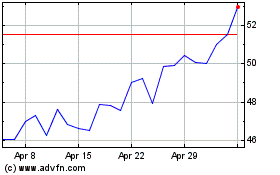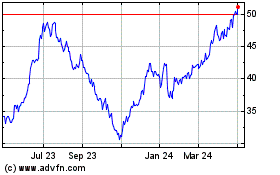By Alison Sider and Michelle Hackman
Airports from New York to Los Angeles, in some cases with help
from airlines, are trying out ways to take passengers' temperatures
before they fly, after the government's plans for a national
program have lost momentum.
Temperature checks at airports aren't a panacea, and some
passengers might find them intrusive. But officials at airlines and
airports view temperature scans as a key part of their efforts to
prevent infection and restore confidence in flying after the
coronavirus pandemic decimated travel demand.
The number of passengers streaming through airports remains down
some 70% from a year ago. Many Americans simply have nowhere to go,
with vacations and business trips called off; others have been
deterred by government restrictions on travel. But surveys indicate
that many also perceive flying to be a serious health risk, despite
the industry's efforts to persuade them otherwise.
Airlines, airports and the government have been deadlocked for
months over who -- if anyone -- should take on the role of checking
travelers' temperatures. Airlines and airports have held that it is
the government's job. Airlines have been lobbying since the spring
for the Transportation Security Administration to coordinate
screenings.
A Trump administration plan to try incorporating temperature
scans into the security screening process at about a dozen airports
around the country stalled in May, as the agencies that would have
overseen the checks raised questions about their practicality and
usefulness.
A number of airports now say they are taking matters into their
own hands.
"We didn't want to wait," said Justin Erbacci, chief executive
of Los Angeles World Airports, which runs Los Angeles International
Airport.
The airport in June began using thermal cameras to identify
people with elevated temperatures as they enter the international
terminal. It has since expanded the trial to another terminal with
help from Delta Air Lines Inc.
Seattle-Tacoma International Airport went ahead with its own
14-day trial program this summer. The private operator of John F.
Kennedy International Airport's busiest terminal ran a test of
thermal imaging technology in August.
Some experts say temperature screenings aren't effective and
might provide a false sense of security, because travelers could be
asymptomatic carriers of the new coronavirus, or could be infected
and not showing symptoms yet. A U.K. study released in February
estimated that temperature screening at airport entries and exits
would catch less than half of infected travelers.
Katie Gostic, a University of Chicago epidemiologist who has
studied the effectiveness of temperature scans at airports, said
the infrared temperature scanners most often used in temp scans
detect fevers about 70% of the time. More importantly, she said,
infected passengers are much more likely to fly before they start
showing symptoms.
"Once you feel terrible, you're not going to try and get on a
plane," she said.
Temperature checks have become standard at entry points to many
offices, schools and even hair salons in the U.S. Screenings are
also relatively common at airports abroad, begun in response to the
severe acute respiratory syndrome -- or SARS -- pandemic in the
early 2000s. The Canadian Air Transport Security Authority this
summer began conducting temperature screening. London's Heathrow
Airport is trialing it, and several European airlines have started
requiring preboarding scans.
The Centers for Disease Control and Prevention in the U.S.
initially recommended temperature scans for detecting Covid-19, the
disease caused by the new virus, but concerns arose as more
evidence became available showing as many as half of infected
individuals don't run fevers, according to two people familiar with
the matter.
The TSA looked into the mechanics of performing the checks, but
some questions were never fully resolved -- for example, who would
determine whether a person with a high fever had some other medical
condition or would be allowed to fly, according to people familiar
with the matter.
After initial enthusiasm for the measure, the White House cooled
on airport temperature checks as the administration made a
strategic decision to shift focus away from the pandemic, according
to people familiar with the matter.
In a set of guidelines for the travel industry, a consortium of
federal agencies acknowledged that some airports and airlines might
want to conduct temperature scans, but raised similar concerns
about the checks' usefulness.
Airlines and airports acknowledge that temperature scans -- like
plexiglass barriers and uniformed cleaning crews -- are in part
meant as visible safety measures that can help set passengers'
minds at ease. Airlines have been adjusting their protocols for
cleaning, social distancing and mask requirements throughout the
summer as they desperately tried to get passengers flying again.
United Airlines Holdings Inc. announced Sunday that it would
permanently eliminate flight-change fees for most domestic tickets,
a move that takes away one of the main incentives for people who
are sick to try and travel anyway.
Rapid Covid-19 testing at airports might do even more to allay
passengers' fears. Several airports around the world offer or
require tests for arriving passengers. Now, with the development of
new tests that can offer results before passengers board flights,
some are starting to make tests available to departing passengers
as well.
San Francisco International Airport has a rapid-testing facility
in its international terminal for employees and hopes to eventually
provide tests for passengers too. Fliers at JFK and Newark Liberty
International Airport can get tested at XpresCheck, part of the
XpresSpa airport massage and manicure chain, and the locations plan
to roll out rapid 15-minute tests in September.
Frontier Airlines since June has been taking passengers'
temperatures and barring anyone with a temperature of 100.4 degrees
Fahrenheit or higher in multiple checks from boarding flights.
Other carriers ask passengers a series of health questions at
check-in.
LAX's Mr. Erbacci said individual temperature checks with
hand-held cameras could lead to long lines, so the airport opted
for walk-by scans with thermal cameras, which passengers can bypass
if they wish.
Eastern Iowa Airport in Cedar Rapids has been seeking approval
for its program from the Federal Aviation Administration, which has
cautioned airports against using their own resources for health
screening programs, such as temperature checks.
The airport's plan calls for health-care professionals from a
local hospital to conduct the screenings, including a follow-up
check with a nurse or doctor via telehealth technology to determine
whether another condition, such as allergies or an ear infection,
could be the cause of a fever.
Because the airport is small, the program is feasible. "It's not
a model that works for all airports," said Marty Lenss, the
airport's director.
Some airlines haven't given up trying to persuade the government
to take on the task.
Southwest Airlines Co. is working on a temperature-scanning
program at Dallas Love Field Airport and aims to start screening
customers next month, an effort Southwest CEO Gary Kelly said was
launched for "the sole purpose of trying to demonstrate to the TSA
the efficacy of the process."
Write to Alison Sider at alison.sider@wsj.com and Michelle
Hackman at Michelle.Hackman@wsj.com
(END) Dow Jones Newswires
August 31, 2020 08:32 ET (12:32 GMT)
Copyright (c) 2020 Dow Jones & Company, Inc.
Delta Air Lines (NYSE:DAL)
Historical Stock Chart
From Mar 2024 to Apr 2024

Delta Air Lines (NYSE:DAL)
Historical Stock Chart
From Apr 2023 to Apr 2024
